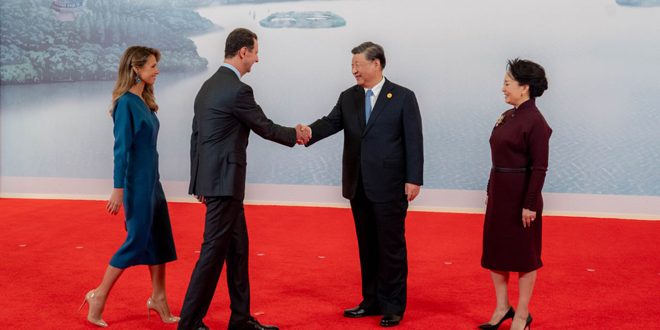Just days before Syrian regime leader Bashar al-Assad signed three economic agreements during his visit to China, the American Institute for the Study of War (ISW) released a significant update on Iranian activities in Syria. Their assessment suggests that as Russian-backed Wagner militia fighters vacate positions near Syria’s natural resource-rich areas, notably phosphate deposits, Tehran is poised to step in. Coinciding with these developments, an Iranian opposition group leaked documents outlining Iran’s long-term plans for investment, with a strategic focus on partnering with Chinese companies for industrial development, both within Iran and on Syrian soil.
While the recently inked “strategic partnership” agreements between the Syrian regime and China remain somewhat vague, the ISW report underscores the potential consequences of the Wagner fighters’ withdrawal, following a warning from the Russian Ministry of Defense about a month ago. The report predicts that Iran is likely to assume control over some of these positions, enabling an expansion of its economic operations in Syria’s desert regions.
The ISW report is based on information from Russian opposition investigative journalists, Syrian opposition media sources, as well as prior reports from Western media outlets such as the Wall Street Journal and the New York Times. The report suggests that Wagner officials may prefer transferring control of their sites and assets in Syria to Iran rather than the Russian Ministry of Defense, especially following the suspicious plane crash that claimed the life of militia leader Yevgeny Prigozhin a month ago.
After the UAE, Saudi Arabia Seizes Millions of Captagon Pills, Arrests Syrians
While Syrian media sources claim that Russian forces are working to regain control of sites near oil and gas fields left vacant by departing Wagner militia, Western sources indicate that Iran’s Quds Force, affiliated with the Iranian Revolutionary Guard, is engaging with Wagner leaders to find solutions for their positions and warehouses in Syria.
The ISW report concludes that the withdrawal of Wagner forces from Syria offers Iran the opportunity to establish a lasting presence in the Syrian Badia region. This region is strategically important for transporting weapons and military equipment to Iranian proxies in the area and holds one of the world’s largest known phosphate reserves.
Interestingly, the report also highlights the economic challenges facing both Russia and Iran, making it difficult for them to invest significantly in Syria’s reconstruction. This challenge has become more pronounced as the possibility of Arab countries contributing to Syria’s reconstruction has dwindled. In light of this, Assad’s visit to China aimed to convince Beijing to fill this void. The key question is whether Beijing can do so independently or in coordination with Iran.
The latest leak from the Iranian opposition group “Revolution to Overthrow the Regime” offers insights into this question. Iran, which holds an official contract with Syria to exploit roughly 60% of its phosphate wealth for 50 years (with possible extensions), has devised plans to enhance the production and export of this resource in Syria. Negotiations with Iranian, Lebanese, and Chinese companies are underway, although some have encountered obstacles, primarily due to sanctions.
According to information from the leaked document, Iran intends to establish factories for phosphoric acid, phosphate refining, calibration, and drying. Some of these facilities will be in Iran, while others will be in Syria. Notably, negotiations with a Chinese company are ongoing to rebuild phosphate calibration plants in Syria.
While Assad conducted his visit to China with the aim of transforming long-standing economic pledges of support into reality, the commander of the Quds Force, Ismail Qaani, was in Syria, overseeing joint military operations with regime forces and discussing the challenges and security issues facing Syria, according to Iranian media.
If the main obstacle to Chinese involvement in Syria’s reconstruction is the perceived lawlessness in the region, Iran seems poised to position itself as the party capable of addressing this challenge. If Iran struggles to collect debts from Syria due to its limited ability to finance reconstruction efforts, China may emerge as the ideal partner. This suggests that Chinese investment influence in Syria would complement and reinforce Iranian influence rather than compete with it. The prerequisite for this scenario is a strong commitment from China to take calculated risks in Syria and collaborate extensively with Tehran.
This article was translated and edited by The Syrian Observer. The Syrian Observer has not verified the content of this story. Responsibility for the information and views set out in this article lies entirely with the author.


